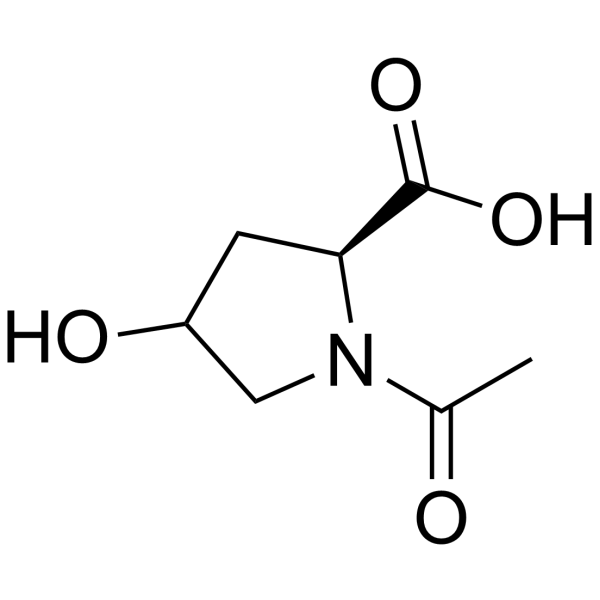N-Acetyl-4-hydroxy-L-proline
Modify Date: 2025-08-20 19:10:44

N-Acetyl-4-hydroxy-L-proline structure
|
Common Name | N-Acetyl-4-hydroxy-L-proline | ||
|---|---|---|---|---|
| CAS Number | 926905-71-7 | Molecular Weight | 173.167 | |
| Density | 1.4±0.1 g/cm3 | Boiling Point | 442.1±45.0 °C at 760 mmHg | |
| Molecular Formula | C7H11NO4 | Melting Point | 131 °C | |
| MSDS | N/A | Flash Point | 221.2±28.7 °C | |
Use of N-Acetyl-4-hydroxy-L-prolineN-Acetyl-4-hydroxy-L-proline (cis- and trans- mixture) is a proline derivative[1]. |
| Name | Oxaceprol |
|---|---|
| Synonym | More Synonyms |
| Description | N-Acetyl-4-hydroxy-L-proline (cis- and trans- mixture) is a proline derivative[1]. |
|---|---|
| Related Catalog | |
| In Vitro | Amino acids and amino acid derivatives have been commercially used as ergogenic supplements. They influence the secretion of anabolic hormones, supply of fuel during exercise, mental performance during stress related tasks and prevent exercise induced muscle damage. They are recognized to be beneficial as ergogenic dietary substances[1]. |
| References |
| Density | 1.4±0.1 g/cm3 |
|---|---|
| Boiling Point | 442.1±45.0 °C at 760 mmHg |
| Melting Point | 131 °C |
| Molecular Formula | C7H11NO4 |
| Molecular Weight | 173.167 |
| Flash Point | 221.2±28.7 °C |
| Exact Mass | 173.068802 |
| LogP | -2.04 |
| Vapour Pressure | 0.0±2.4 mmHg at 25°C |
| Index of Refraction | 1.561 |
| InChIKey | BAPRUDZDYCKSOQ-GDVGLLTNSA-N |
| SMILES | CC(=O)N1CC(O)CC1C(=O)O |
| trans-1-Acetyl-4-hydroxy-1-proline |
| (2S,4R)-1-acetyl-4-hydroxypyrrolidine-2-carboxylic acid |
| N-Acetyl-L-hydroxyproline |
| Oxaceprol |
| L-Proline, 1-acetyl-4-hydroxy-, (4R)- |
| (2S,4R)-1-acetyl-4-hydroxy-proline |
| (4R)-1-Acetyl-4-hydroxy-L-proline |
| (-)-1-Acetyl-4-hydroxy-L-proline |